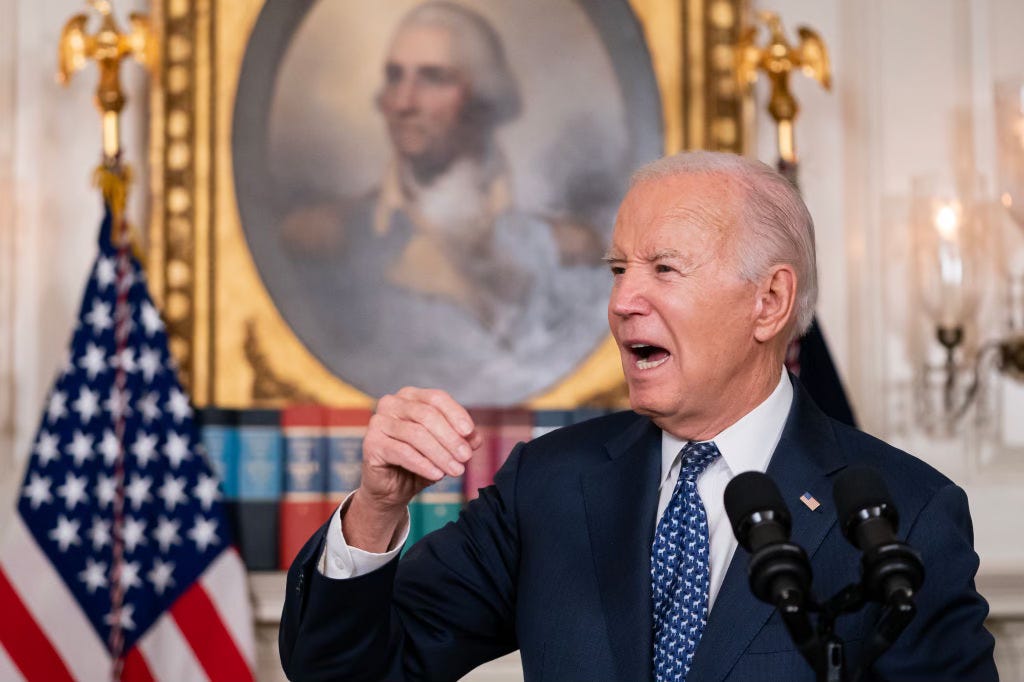
Of the many red flags for President Biden in the recent NBC News poll, the biggest is that his job approval has worsened even as public perception of the economy is on the rise. In fact, Biden’s economic job disapproval is tied for an all-time low—61 percent—as the number of Americans expressing negative views of the economic future is at its best level since April 2021.
It’s possible that improving macroeconomic indicators—the stock market hitting record highs, inflation contained, the likelihood of the Federal Reserve reducing interest rates before the election—could eventually boost Biden’s standing.
But the more alarming interpretation for Democrats of the latest political polling is that Americans aren’t feeling like it’s morning in America—or anything close to it—in part because the president himself isn’t effectively making the case to Americans that the economy is turning the corner. The number of Americans who believe the country is on the wrong track (73 percent) is still at historic highs.
The past week’s events sum up how Biden’s advanced age and declining mental acuity are preventing him from doing the normal salesmanship expected of any president, especially one seeking re-election. The special counsel’s report calling the president a “sympathetic, well-meaning, elderly man with a poor memory” is one of those lines that will be etched in the political history books.
Biden’s decision Thursday to angrily rebut the notion that his faculties are diminished only reinforced the widespread perception. He confused the president of Egypt with Mexico, and angrily feuded with reporters asking if he was up to the job. The liberal New York Times editorial board wrote last Friday that Biden “had less substantive, unscripted interaction with the public and the press than any other president in recent memory.”
It’s a reminder that the bully pulpit matters for presidents in shaping their political reality. Former presidents Ronald Reagan, Bill Clinton, and Barack Obama were charismatic and talented communicators, and used their rhetorical skills to sell the American public on their agenda despite facing rocky political prospects during their first term.
Biden, who never was much of a political salesman even in his prime, has shown he’s utterly incapable of driving home his administration’s message. Over three-quarters of Americans (76 percent) now have major or moderate concerns that Biden doesn’t have the mental and physical health for a second term, according to the NBC poll.
The special counsel’s conclusions of the president’s acuity is just the latest example of the president playing with a severe political handicap just as he enters campaign season.
The American public heard nothing from Biden after he ordered strikes against Iranian terrorist proxies. There hasn’t been a presidential address explaining the significance of the mission. Biden barely sold the tougher border security measures in the now-dead bipartisan Senate package, and failed to aggressively slam the Republican Party for not taking the opportunity to deal with the border crisis when the opportunity presented itself.
Biden didn’t publicly celebrate his landslide South Carolina primary victory, which could have given him the opportunity to highlight the importance of the African-American vote in this year’s election. A friendly interview on Al Sharpton’s weekend MSNBC show after the big win, for instance, could have given him a boost with a critical Democratic Party constituency that’s been notably unenthusiastic towards Biden lately.
Most telling is the fact that Biden turned down the opportunity to sit for an interview before last night’s Super Bowl—a rare opportunity to reset the administration’s messaging in a friendly venue where tens of millions of Americans would be watching. In today’s fragmented media landscape, there’s no comparable opportunity to drive home a message.
The decision to pass up the interview—on CBS, not FOX—was a clear sign his staff was seriously concerned the president would make an embarrassing gaffe or demonstrate that he’s not nearly as engaged as advertised.
That’s a major warning to Democrats who think that Biden’s fortunes will automatically be turned around by an improving economy or Trump’s own legal problems. Biden will have to make the case to voters and that requires making the case publicly—on the campaign trail, in press conferences, and in interviews with reporters. He won’t be able to replicate a basement campaign during the peak of the COVID pandemic, like he did in the last election.
The biggest difference of a likely Biden-Trump rematch from 2020 is that Biden is the incumbent, and Trump is the challenger. Sitting presidents have the advantage of shaping their own destiny, but they can’t just sit idly by as domestic and international challenges pile up around them. Biden holds the title of commander-in-chief, but he doesn’t look like he’s doing a whole lot of commanding.
Trump, freed from the responsibilities of governing, finds himself as an insurgent, playing the role of opposition leader. His downfall in 2020 stemmed from incompetence, particularly in handling the nation’s response to COVID, but he now can criticize the administration’s missteps and scuttle bipartisan priorities like aid to Ukraine and a border security bill without any obvious consequences.
Another telling statistic from the NBC poll: Nearly half (48 percent) of Americans said they think that Trump would be “more competent and effective” while just under one-third (32 percent) thought the same of Biden. Some of that gap is about their respective records, but much of it is about an 81-year-old president showing every bit of his advanced age.
Josh Kraushaar (@JoshKraushaar) is the Editor in Chief of Jewish Insider and a Fox News Radio political analyst.



